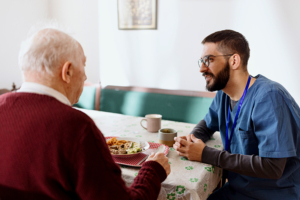What to Do When a Senior Does Not Want to Eat

Learn what to do when a senior does not want to eat at mealtime.
Following the holiday feasts, many people choose to reduce their calorie intake. But when a senior loved one refuses to eat altogether or is making unbalanced or unhealthy dietary choices, it is important to look for the cause associated with this behavior and to recognize how to encourage them to get on track with healthier eating.
Why Do Senior Eating Habits Change?
There could be many factors at play when a senior does not want to eat or when they begin to make poor dietary choices – as well as many ways you can help overcome them:
- Issues with dental health. Speak with the dentist to determine if dentures should be refitted or if there are any other dental concerns that need to be addressed. You may want to provide foods which are softer and/or cut them into smaller pieces. Lentils, ground meat, and beans, for example, are easier to chew than a steak or pork chop.
- Low vision. If the senior is unable to see clearly, they may regard foods differently and lose interest in eating. Vision problems can also make it more difficult and even dangerous to prepare meals as well as get out to pick up groceries. Offer to help with shopping and meal prep (or let us help!) and serve foods that are brightly colored and contrasted to the colors of serving dishes, place mats, the tablecloth, etc. so they’re more easily seen.
- Side effects from medications. Schedule an appointment with the physician for a complete review of all medications being taken, and find out if one or more could be leading to a loss of appetite or troubling gastrointestinal side effects. See if the medication can be changed to something more tolerable or if perhaps the dosage can be changed.
- Loneliness. This is a standard problem among older adults, and can make mealtime less enjoyable. Share meals whenever possible with a lonely senior loved one, invite friends and neighbors to join them, or contact Responsive Home Care for a caregiving companion to assist.
- Loss of taste or smell. Aging as a whole often results in a dulling of these senses, which may affect the satisfaction of eating. Try experimenting with more aromatic and flavorful spices and herbs while preparing meals, such as ginger, garlic, and thyme.
Responsive Home Care is here for older adults struggling to keep up a healthy diet, for whatever reason. When a senior does not want to eat at their regular mealtimes, we can partner with you to help provide senior loved ones with every chance to once again enjoy meals and establish improved eating habits. Contact us online or at (954) 486-6440 to discover how we can help with our services for elder care in Hollywood, FL and the nearby areas.

